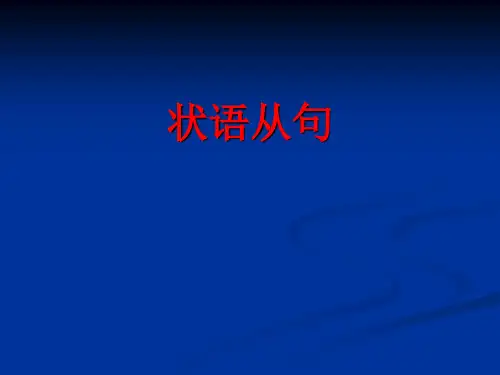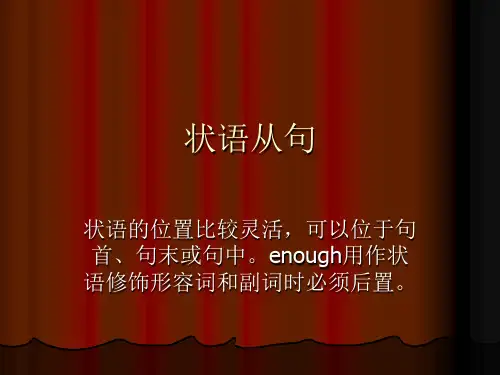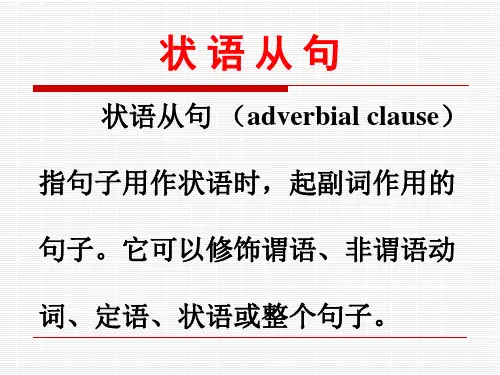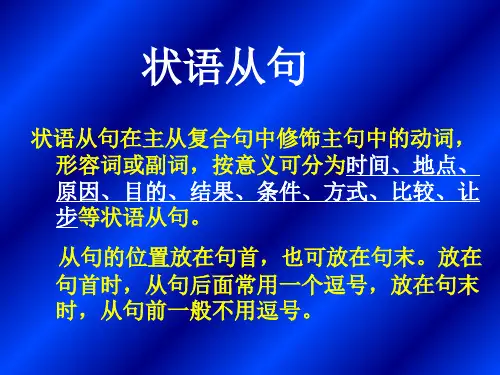- 1、下载文档前请自行甄别文档内容的完整性,平台不提供额外的编辑、内容补充、找答案等附加服务。
- 2、"仅部分预览"的文档,不可在线预览部分如存在完整性等问题,可反馈申请退款(可完整预览的文档不适用该条件!)。
- 3、如文档侵犯您的权益,请联系客服反馈,我们会尽快为您处理(人工客服工作时间:9:00-18:30)。
在…之前
after
在…之后
since
自从…以来
till/ until
直到
C
as soon as
一…就
the moment
一…就
the minute
一…就
every/ each time
每次
D
hardly… when
一…就
scarcely…when
刚一…就
no sooner ..than
一…就
instantly/ directly
状语从句 分类
1时间状语从句
6让步状语从句
2地点状语从句
7比较状语从句
3原因状语从句
8方式状语从句
4条件状语从句
9结果状语作或状态发生、存在的时间。
时间状语从句可以由以下连词或词组引导
A
when
当…时
while
当…时
as
当…时
whenever
无论何时
B
before
1. as, while , when的区别
as引导的时间状语从句, 可以表达“正当……”, “一
边……一边……”,“随着……”等意思。
1. 表示某事一发生,另一事立即发生。 As the sun rose, the fog disappeared.
2. 表示在某事发生的过程中,另一事发生。
Just as he was speaking there was a loud explosion.
whether… or… , whether … or not 表示“不论是否……”, “不管是……还是……”。其引导的从句旨在说明正反两 方面的可能性都不会影响主句的意向或结果。 You’ll have to attend the party whether you are free or busy.
归纳: no matter+疑问词不能引导主语从句和宾语从句, 而 “疑问词+ever”则可以
引导目的状语从句的连词: in order that … 用于正式文体中,所引从
句可于主句前或后。
so that
a. 较常用,一般用于主句后,有时 可分开,so 有时可省; 从句中要有 情态动词, 否则, 就成为下一种句型:
ill.
表示“直接”原因。
c.f. He might be ill, for he didn’t come to
school.
表示“间接的推断”原因. 不可出现在句首。
because, since, as, for的区别:
because—直接原因,非推断.语气最强. 回答why的问题。
since – 通常放句首.译为“既然”
例句翻译:自从她大学毕业已经有六年时间了。 It has been (is) six years since she graduated from the university.
until/ till引导的时间状语从句
◆ until / till 引导的时间状语从句,常译为“直到……时”, 表示主句动作发生在从句之前。
as soon as引导的时间状语从句
◆ as soon as 引导的时间状语从句,译为“一…就…”, 表示从句动作一发生,主句的动作马上就发生。
例句:他一回来我就告诉他这件事。 I will tell him about it as soon as he comes back.
◆
相当于as soon as 用法的词或短语还有:immediately, directly, instantly, the moment, the minute, the instant等.
when
While I really don’t like art, I find his work impressive. ( while =______a_lt_h_o)ugh
While there is life there is hope.
(while = ____a_s__lo_n_g_ )as
as– 不谈自明的原因,语气最弱。
for– 放句中,引导后半句表原因, 或补充推断 的理由。
条件状语从句表示主句中的某一动作或状态 是在什么情况或条件下发生的。条件状语从句 中通常用一般现在时表示将来。
条件状语从句由从属连词引导:if, unless (除 非), as / so long as (只要), on condition (只要), once ( 一旦), in case (假使) , providing / provided (that) 等。 e.g. a.We’ll come over to see you on Saturday if we
have time.
b. We should serve the people as / so long as we live.
在复合句中表示让步概念的状语从句被称为让步状语 从句。常用引导词:though, although, even if, even though, no matter + 疑问词(what/ who/ where/ when/ which/ how) 疑问词-ever
(whatever, whoever, wherever, whenever, however, whichever)
特殊引导词: as (用在让步状语从句中必须要倒装), while ( 一般用在句首 ), whether… or… , whether (…) or not
though, although
He likes pop music, while I am fond of folk music.
when: 持续性/非持续性动词都可
*当……时
e.g. When I first saw her, I fell in love with her. ---When did you get home?
◆当主句谓语动词是延续性动词时,主句常用肯定形式。
◆当主句谓语动词是非延续性动词时, 主句常用否定形式。 not… until…“直到……才……”,这时until 可用before替换。
例句:他直到做完作业才睡觉。 He didn’t go to bed until he finished his homework.
---It was eight o’clock when I got home.
*正在……忽然 I was about to go swimming when our guide stopped me.
before引导的时间状语从句
◆ before引导的时间状语从句,常译为“在……之前”, 表示主句的动作发生在从句的动作之前。
3. 表示两个动作同时发生。 Helen sang a song as she washed.
4. 表示“随着…..”.常指一个行为是另一个行为的结果, 或一种状态随另一种状态变化。 As she grew older, she became more beautiful.
while:持续性动词 /进行时
◆要点归纳: though, although当“虽然”讲, 都不能和 but 连用. 但是他们都可以同yet (still) 连用.
ever if, even though even if 和 even though 表示“ 即使”
We’ll make a trip even though the weather is bad.
◆ 判断以下句子是否正确: Although he is rich, but he is not happy.
Although he is rich, yet he is not happy.
Although we have grown up, our parents still treat us as children.
原因状语从句表示主句中的某一动作或状态所 发生的原因。引导这种从句 常用的连接词是:
because, as, since, now that, for,和considering that, seeing that 这七个连词都用于表示表示原 因, 但在语气上一个比一个弱。
e.g. He didn’t come to school because he was
地点状语从句用连接副词 where或wherever (在任何地方) 引导。 e.g. a. Just stay where you are.
b. Where there is a will, there is a way. c. You can sit wherever you like. d. Wherever you go, I’ll be right here waiting for you.
Whether you believe it or not, it is true.
no matter + 疑问词 疑问词-ever
No matter what happened, he would not mind. Whatever happened, he would not mind. 替换:no matter what = whatever no matter who = whoever no matter when = whenever no matter where = wherever no matter which = whichever no matter how = however
*一般或现在情况
e.g. I like listening to music while I am doing my homework.
*将来情况-V一般现在时或现在进行时
e.g.— I’m going to the post office. -- While you are there, can you get some










